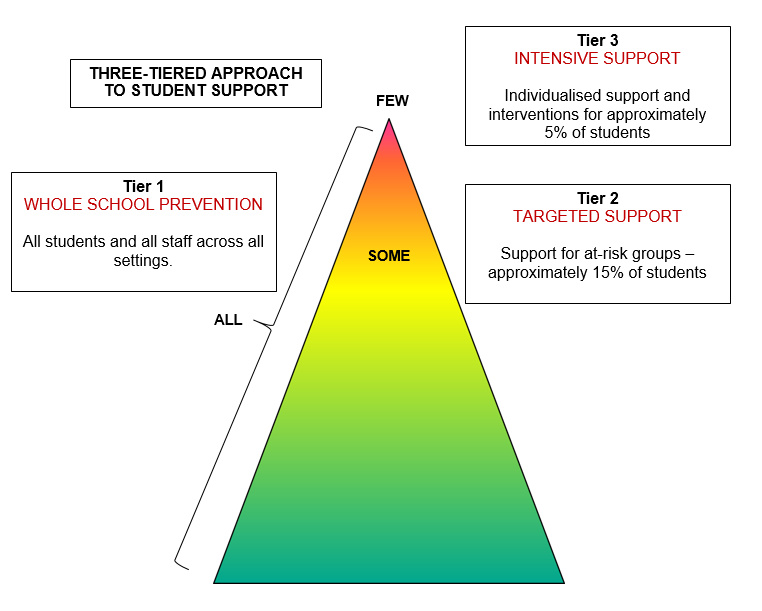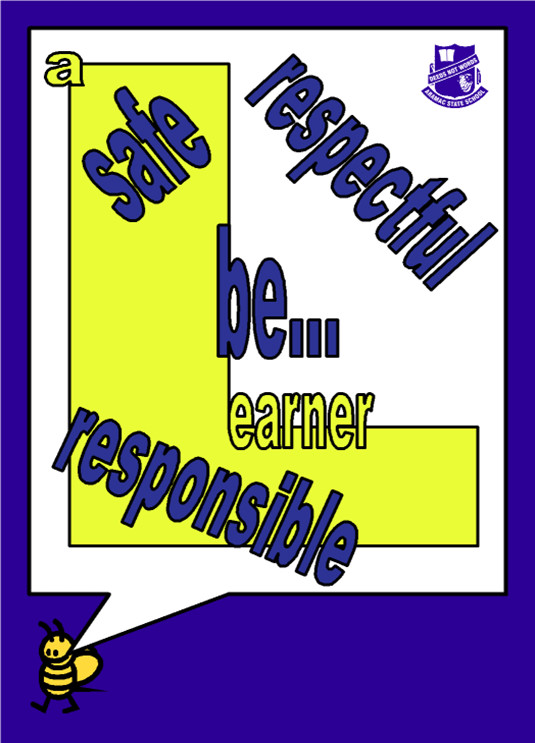What is PBL?
Positive Behaviour for Learning (PBL) is a collaborative, educative, proactive, and functional process used to develop effective interventions for inappropriate behaviour.
PBL is:
- Collaborative: team-based
- Educative: teaching appropriate skills
- Proactive: encouraging corrective behaviours
- Functional: focusing on the function of behaviour
- Process: individualised for our school
PBL Beliefs
| Focuses on increasing instructional time and student engagement | Students know what to do because they have been taught | Data is used to guide decision making and monitor progress |
| Building positive classroom environments and relationships | Students who make behavioural errors are corrected with re-teaching and practice |
|
At Aramac State School, students are supported across all three levels of intervention (Green, Yellow, and Red Zone). The PBL team focuses on the Green Zone (or Tier 1) systems, practices, and data. Currently, the Student Services team, focus on Yellow Zone (Tier 2) and Red Zone (Tier 3) systems, practices, and data.

Tier 1 'universal' supports
Tier 1 'differentiated and explicit teaching for all students' or school-wide interventions are the critical foundation for PBL. Interventions are at the whole-school level and are provided to all students across academic, emotional and behaviour dimensions of learning.
The focus of Tier 1 intervention is on all students and staff across all settings—whole-school, classroom and non-classroom settings.
Tier 2 'targeted' interventions
Tier 2 or 'focused' interventions support approximately 15% of students in a typical school who are not responding to Tier 1 and who have moderate, ongoing behaviours of concern (social, behavioural and academic). Support is provided through additional Tier 2 or "targeted" level interventions.
The focus of Tier 2 is to reduce the number of existing students requiring additional support.
Tier 3 'intensive' interventions
Tier 3 or 'intensive' interventions support approximately 5% of students who have not responded to Tier 1 and Tier 2 interventions. Students may require Tier 3 or 'intensive' level of supports, involving highly individualised interventions to support a tailored learning program. The focus of Tier 3 is to reduce the intensity and complexity of existing individual student’s situations.
It is important that students requiring Tier 2 and Tier 3 interventions have received, and are continuing to receive, the same level of Tier 1 support as other students. Tier 2 and 3 interventions are only effective when Tier 1 foundations are strong. If there are more than 15% of students receiving Tier 2 support then more attention has to be paid to Tier 1.
PBL in Aramac State School
Aramac State School prides itself on being a Positive Behaviour for Learning (PBFL) school. Our three
key school expectations are:
- Be Safe
- Be Responsible
- Be Respectful
Each week an expectation is explicitly taught and practised in
class, this teaching addresses how this expectation will look inside and out of the classroom in a variety of settings.
For more information on the behaviour expectations we have at Aramac State School, please refer to our PBL Behaviour Matrix (PDF, 194KB). This matrix also aligns to the Australian Curriculum.
As students demonstrate school expectations they are positively acknowledged in numerous ways including the student of the week, writer of the week and in class reward systems. Additionally, all students are rewarded when they demonstrate these expectations through a whole school rewards system.
- Stamps are given to students who demonstrate these expectations in class. Rewards for these stamps are given at the end of each termin the form of either a voucher to a local shop or and end of term reward day.
- Gotchas are given to students who demonstrate these expectations at lunchtime. Recognition of these occurs each week on assembly, where one is drawn from a box and prize is awarded.
Students who don’t follow the school expectations will receive an appropriate consequence for their behaviour. Examples of these consequences can be found in the image here as well as the
PBL Consequences (PDF, 175KB).